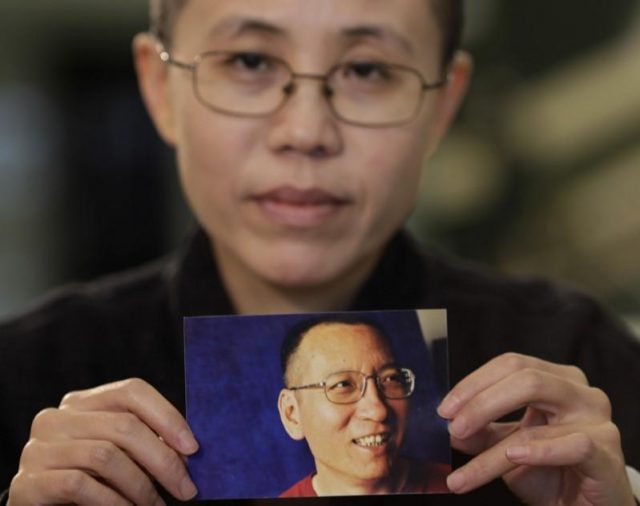
BEIJING – Friends of China’s Nobel Peace Prize-winning dissident Liu Xiaobo, who died of liver cancer in custody, said on Friday they are still unable to contact his widow, Liu Xia, and that ensuring her freedom is now a top priority.
Liu Xiaobo, 61, was jailed for 11 years in 2009 for “inciting subversion of state power” after he helped write a petition known as “Charter 08” calling for sweeping political reforms.
Liu Xia has been under effective house arrest since her husband won the Nobel Peace Prize in 2010 and was allowed to visit him in prison about once a month. She suffers from depression.
Liu Xiaobo died Thursday after suffering multiple organ failure. He was recently moved from jail to a hospital in the northeastern city of Shenyang to be treated for late-stage liver cancer.
Rights groups and Western governments have mourned Liu Xiaobo’s death and also called for Chinese authorities to allow his wife and the rest of his family to move around freely.
Freedom of movement
United Nations High Commissioner for Human Rights Zeid Ra’ad Al Hussein also urged China to guarantee Liu Xia freedom of movement, and allow her to travel abroad should she want to.
Australian Foreign Minister Julie Bishop urged China to lift curbs on the movement of Liu Xia, in a statement sent to Reuters on Friday.
China responded by lodging “stern representations” with countries that made remarks about Liu Xiaobo, including the United States, expressing its firm opposition, foreign ministry spokesman Geng Shuang told a regular briefing.
No information
Geng said he had no information about Liu Xia, but added that the entry and exit of Chinese citizens would be handled in accordance with Chinese law.
“Let’s not make any prejudgments here,” he responded, when pressed on whether Liu Xia was allowed to leave the country. He did not elaborate.
In an interview, Hong Kong’s chief executive, Carrie Lam, said she shared the compassion of people over Liu’s death.
Top priority
Hu Jia, a fellow dissident and family friend, said Liu Xia’s freedom was now a top priority for Liu Xiaobo’s supporters.
“Now, we are most concerned about Liu Xia, but there has been no information about her. She is at this moment the person who is suffering most,” Hu said.
“All the willpower and force we put behind freeing Liu Xiaobo, we have turned to Liu Xia,” he said, urging the United States and Germany to continue pressuring China to free Liu Xia.
Liu Hui, too
Efforts should also focus on Liu Hui, the younger brother of Liu Xia, who was sentenced to 11 years in prison in 2013 for fraud and to whom Liu Xia is very close, Hu said.
Several other family friends confirmed they were still unable to contact Liu Xia or confirm her whereabouts.
Taiwan-based Wu’er Kaixi, a leading figure in China’s 1989 pro-democracy movement who knew Liu, made a plea to world leaders to suspend official interactions with China until Liu Xia was released.
“I want to urge the world, urge the world leaders, that you failed to save Nobel peace laureate Liu Xiaobo,” he said.
‘Do not fail Liu Xia’
“You failed to help him to receive his last wish, which is freedom and medical treatment he deserved. Please, do not fail again to save Liu Xia.”
A video clip of Liu Xiaobo’s treatment was released by the Shenyang justice department on Friday, the latest in a series issued by authorities who say he was well cared for in hospital.
It emphasized that Liu Xiaobo’s family had a history of liver cancer and that Liu Xia and his family were involved in the treatment process and kept abreast of developments.
Funeral Arrangements
Friends have also begun calling to be allowed to participate in Liu Xiaobo’s funeral arrangements and support his wife and family.
More than 150 friends and supporters, including some of China’s most prominent dissidents, rights lawyers and intellectuals, have also signed an open letter announcing plans for an “online memorial” to Liu.









